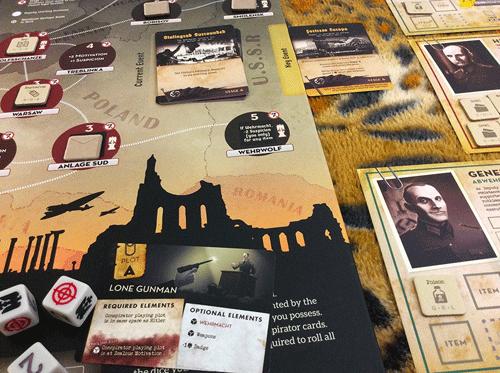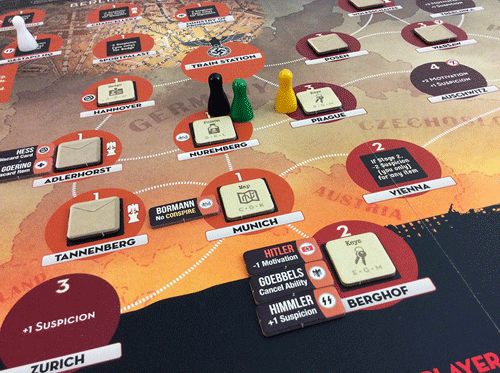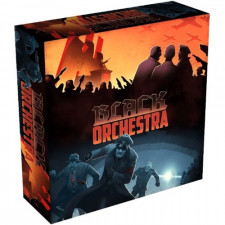Black Orchestra Review
on Dec 15, 2016
**Please Note: Review is of Black Orchestra (1st Edition).**
If you Google “Black Orchestra,†you’ll mostly get pictures of African-Americans playing classical music. If you’re lucky, you’ll also learn about the Schwarze Kapelle, the historical German conspiracy to assassinate Adolf Hitler. You might know them from such fine films as Tom Cruise’s Valkyrie, which followed the group’s failed July 20, 1944, plot to plant a bomb in a conference room full of high-ranking Nazi officers: the bomb went off, but Hitler was only mildly singed while the Gestapo backlash resulted in 7,000 arrests and 5,000 deaths). That’s exactly the type of outcome you’re trying to avoid in Philip DuBarry’s cooperative game Black Orchestra.

A Lone Gunman attempt has failed as the war comes to a close.
Black Orchestra is a moderately rules-light game with a strong historical flavor. It’s played on a simplified map of Hitler’s Europe (with a magnified inset of Berlin) which gradually opens up and then recedes as the war progresses. During the game, you’ll move around the map, reveal and pick up items, and (hopefully) use those items in a successful assassination plot. The plots come from a deck of Conspirator cards, which also include special actions and ongoing effects. Meanwhile, Event cards are constantly shuttling Hitler and his lieutenants to new locations.
Most plots require a conspirator to be in Hitler’s space and list a number of secondary conditions, mostly items the player can discard to add extra dice to the attempt. Once you’ve gathered your dice, you get one shot to roll them, hoping to get successes (a ⅓ chance) equal to Hitler’s military support level, which can range from 2 to 7. Otherwise, the attempt fails and any items spent are lost. Successful or not, a plot will automatically fail if it’s detected: a player rolls a certain number of Nazi eagles; depending on his conspirator’s Suspicion level, a plot can be detected on anywhere from three to a single eagle. Big, elaborate plots aren’t always better. If the plot succeeds without being detected, the conspirators win.
Those are the game’s basics, but what really makes Black Orchestra work is how its details support the historical atmosphere. Many little rules combine to create the compelling illusion of organizing a conspiracy in one of the most oppressive police states in history. For example, each conspirator has both a Motivation and a Suspicion level. Conspirators with low Motivation can’t attempt plots or use their special ability, but the primary way to raise Motivation--the Conspire action--also has the chance of raising Suspicion. Apart from increasing the odds that a plot is detected, a high Suspicion level can get you arrested: when a Gestapo Raid Event is drawn, any conspirators at the highest Suspicion are sent to Gestapo HQ. To reduce Suspicion, you sometimes need to “deliver†items to various spaces, inventing plausible excuses to be carrying around a bunch of poison or explosives.
This dynamic organically encourages the players to act like real conspirators. Some of characters will be the boots on the street, loudly inciting rebellion to lower Hitler’s military support and pave the way for the actual assassin, groomed to appear trustworthy and conceal his seething hatred for the Nazi party. One particular character might be the fall guy, the one who Conspires most often but has no instrumental role in the plot, deflecting attention from the actual conspiracy. Because the assassin will want to keep his Suspicion low and there are only so many item slots, he’ll be loaded down with innocuous parcels for delivery and passed the plot-critical items at the crucial moment. It’s brilliant.

Hitler and his lieutenants also hit you with negative modifiers if you start your turn in their space.
The coolest and most frustrating thematic element is how interrogation works. An arrested conspirator is not only prevented from moving around the board and contributing to the plot (naturally), he’s actually a major liability for the team. Each turn he spends at Gestapo HQ, his only action is to roll a single die to attempt to resist interrogation. What constitutes a successful roll changes based on the conspirator’s Motivation, with highly motivated conspirators keeping their silence on most rolls and the most timid conspirators blabbing automatically. Those who fail to resist must draw an Interrogation card and choose one of its bad effects to apply to the other conspirators, the ones who still haven’t been caught. A particularly “cooperative†prisoner can spell doom for the entire team.
Like Hitler’s plan to revitalize the German economy, Black Orchestra has some flaws. The rulebook contains some contradictory information, and some cards make reference to rules from an earlier draft. The special abilities of the conspirators range from MVP to “What’s the point?†It can be easy to forget the special abilities exist at all, since they’re only accessible at certain Motivations and are printed in tiny font in parentheses on the conspirator boards. In general, having low Motivation is un-fun, since it locks you out of many game activities and even reduces your hand size, and there’s no quick way to push it up except getting lucky with the dice.
I’m always willing to forgive a game a few blemishes if it successfully transports me to its setting, and by this metric, Black Orchestra earns its stripes, conveying strong historical flavor without the intimidating complexity of a traditional wargame.

 Customer Support
Customer Support  Subscribe
Subscribe 




 Account
Account  Wishlist
Wishlist 

